Tarlabaşı’s invisible bodies

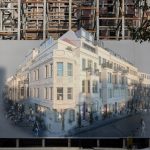
Who shall live here?
Tarlabaşı, a traditional non-Muslim neighborhood in Istanbul, has succumbed to Turkey’s construction boom and is gradually being demolished. After the violent expulsion and flight of the Armenians, Arameans, Greeks and Jews, Kurds, Roma, Africans and also trans people settled here. Only a few people still live in the neighborhood. The remaining residents are exposed to homelessness and uncertainty because they will not be relocated and often cannot find other accommodation. Instead of their listed houses, luxury buildings are to be built.

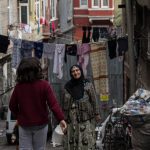

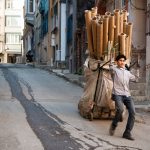

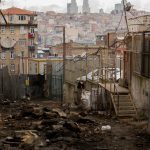


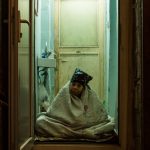

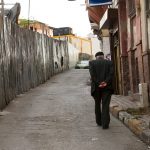

The new hotspot in Istanbul
The location of the district is attractive to many, after all, Tarlabaşı is right in the center of Istanbul, in the Beyoğlu district and has good transport connection. All the houses are gradually being demolished and replaced by a luxury enclave with chic offices and apartments. Before that, the municipalities of Beyoğlu and Fatih passed a new law under the AKP government, which makes it possible to undo the protection of historical monuments: The ‚law for the protection of the destroyed historical and cultural heritage through renewal and reuse‘ was introduced in 2005 and allows the demolition of the listed buildings.
Çalık Gayrimenkul, a Turkish real estate company, has been responsible for the implementation of the “Taksim 360” project since 2007. Çalık Gayrimenkul is part of the Çalık Holding. This is one of the largest Turkish corporations: 34 companies belong to the holding company. President Recep Tayyip Erdogan’s son-in-law, Berat Albayrak, headed the group. In the early 2000s, politicians promoted change to tackle big problems like earthquakes, crime and poverty. As a solution, construction projects were at the top of the political agenda, and so, for example, many so-called “gecekondu” (houses built overnight without official approval) were razed to the ground; after all, they did not harmonize with the new office buildings.
The Taksim 360 project aims to make Tarlabaşı a hotspot for culture, art and entertainment. The famous İstiklal Street is nearby: it is one of the centers of Istanbul’s nightlife and, with around three million visitors every day, a very lively place. The district’s renovation project was awarded the “Best Urban Renewal Project” prize among the six most important European projects at the 18th International Property Awards. The aim is to attract international buyers to the 20,000 square meter new quarter. The former residents were put off with a total of around 163,000 euros. The project includes 952 units.
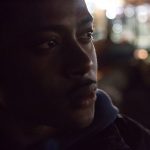
“There is no such thing as racial equality here. They think we're criminals when they see us."
Israel N.
I don’t have time for sightseeing
“There is no such thing as racial equality here. They think we are criminals when they see us. I was invited to do a test job and the boss promised me the job, but he didn’t give me the papers. I studied computer science and only do ‚easy jobs‘ here. On the day of my arrival, I was ripped off by the taxi driver. He charged me 100 dollars for the ride from the airport to Taksim Platz [average price around 14 dollars, author’s note]. People can quickly become rude and aggressive if you don’t understand them, and insult or yell at you. I don’t know anyone here and I mostly get to know black people on the street. That’s how I got my first job: I polished lamps after they were made and got $ 100 for a 60-hour week [$ 1.6/h, author’s note].
Today I only had a coffee [6 pm, author’s note]. You have to live with what you have. I didn’t know it was so cold here. I arrived here with summer clothes on March 23rd of this year. I pay around 155 euros per month for my accommodation [a bedroom and living room, author’s note] and live with several people. There is no agent in between. I rent it directly from the landlord and thus pay less. But I have to move out and the landlord won’t pay me back the deposit. He threatens me with the police if I don’t leave the apartment. Today a friend is helping me to carry the things to him. I will live with him first. Apart from İstiklal Caddesi [shopping street, author’s note], I don’t know any other places in Istanbul. It is full of life and reminds me of a place in Nigeria. I walk this way often. I always think of working. I don’t have time for sightseeing. Besides, nobody shows me the city. ”- Israel N., 23 years old, from Nigeria, lives in Tarlabaşı
Update June 25, 2019
Two years after my first stay in Istanbul, Israel N. was deported to Nigeria because of an expired visa. He now has a son in Istanbul. He lives in Aba, a city in southeast Nigeria that is an important trading center for palm oil.
“[…] There is a lot of corruption here. There is no future here. I want to build my life outside of Nigeria. It’s a nice place, but the infrastructure is poor. I definitely want to go back to Turkey. But I don’t want to spend a lot of time there. If the bank approves a loan, I can pay for the student visa. It will be alright. With time. I don’t have a job at the moment. But everything will be fine. I want to go back to Turkey because the options for onward travel are easier than in Nigeria. In Nigeria, the cost of escaping or a visa to Europe would be much more expensive. The easiest way is to go to Turkey. I hope things turn out the way I planned. „(June 13, 2019)
“[…] I have a black stamp in my passport – when I enter Turkey, I first have to pay a fine. That becomes a problem. That really drives me crazy.“ (June 15, 2019)
The energy of Istanbul in a cup of coffee
„With the restaurants and cafes that offer the most exclusive creations of world cuisine, the businesspeople who want a pleasant and tasty business life are happy,“ advertises Taksim 360.
“On the lower floors there are elegant shops, restaurants, and cafes, on the upper floors there are office areas that offer the most beautiful working environment in Istanbul, 24-hour reception, meeting rooms, air conditioning, cable TV and a short break from your work want to give, you will feel the energy of Beyoğlu and Istanbul when you sip your cup of coffee.“
The residents are given the opportunity to sell their properties. If they fail to do so, they will be expropriated and, if necessary, forcibly removed from their homes. In the past, water cannons were used against the residents. Eviction from their homes can drive them into unemployment or homelessness. You will not find such cheap accommodation anywhere else in the center; you may have to move to the outskirts and you can no longer get to work so easily. In addition to the loss of jobs, the growing interdependence of a district that gave shelter to the minorities is being dissolved and destroyed.
A few years ago, the city decided not to pick up the residents‘ rubbish anymore and instead dumped the rubbish of other residents in the neighborhood. The residents sorted the dumped garbage and sold it or separated certain materials, such as copper, from the rest and recycled them. In addition, the police withdrew from the neighborhood, although there is a police station nearby. This increased crime. In addition, people are not allowed to carry out repairs on their houses because they are listed buildings. People have died in the past due to houses collapsing or other accidents that could have been prevented by repairs.
"We, the white people of Istanbul, are welcome in Tarlabaşı. The black people of Istanbul [Kurds, Roma and Africans, author's note] sell us marijuana and ecstasy." Fatih S. Fatih S.
„Sometimes I need an ‚off-day'“
“I studied Turkish literature and grammar and have been working in a bookstore nearby for ten years. I lost my last room because of crystal [meth, author’s note]. Please do not tell anyone here [in the hostel, author’s note] [used crystal meth and marijuana during the conversation, author’s note]. Sometimes I need an ‚off day‘. This is big city life. Plus, everyone in the area smokes weed, and weed is the least for literature students. Sometimes I need a hangover. I need peace. We, the white people of Istanbul, are welcome in Tarlabaşı. The black Istanbul [Kurds, Roma and Africans, author’s note] sell us marijuana and ecstasy. I never felt happy there. It is good that the houses are being demolished. Everyone sees that you can’t live like that. ”- Fatih S., 34 years old, lives in Istanbul. I met Fatih in a hostel not far from the neighborhood where I stayed. He lives there permanently, which is not unusual.
Tarlabaşı has a political dimension through its history; The ownership structure of the displaced people was not clarified and so other minorities have settled in the abandoned houses. Its residents look to an uncertain future. The Taksim 360 project creates living space for a clientele that doesn’t exist: the economy is collapsing, and political developments are making Turkey unattractive for foreigners and investors.
Yohanan Khodr
Tarlabaşı’s invisible bodies
2017 – 2019
Peter Behrens School of Arts
Department of Design
supervised by Prof. Anja Vormann and
Nina Ditscheid
